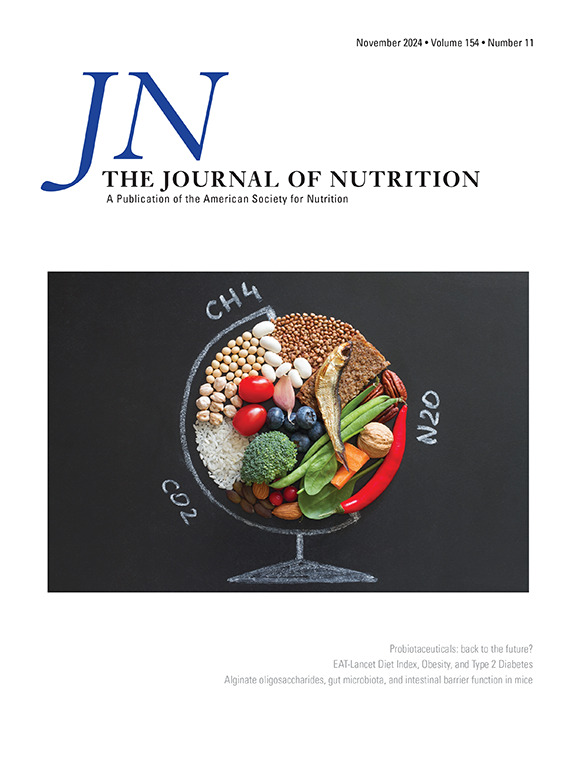Acceptability of Microbiota-Directed Complementary Foods in Treating Indian Children with Moderate Acute Malnutrition: eACT-MAM Pre-Proof-of-Concept Study
IF 3.7
3区 医学
Q2 NUTRITION & DIETETICS
引用次数: 0
Abstract
Background
In India, currently, there are no standard guidelines for the management of moderate acute malnutrition (MAM). Previous research in Bangladesh has shown that children with MAM have impaired gut microbiota development, and microbiota-directed complementary foods (MDCF) can potentially repair their gut microbiota.
Objectives
The objectives of this study were to evaluate the acceptability and safety of supplementing shelf-stable formulation of MDCF in Indian children with MAM as compared with a locally prepared ready-to-use supplementary food (RUSF) in 3 geographically distinct Indian populations and to establish and pilot systems of intervention delivery, collection, transport, and storage of stool samples using stringent protocols.
Methods
This pre-proof-of-concept (prePOC), multicentric, open-labeled, age-stratified, randomized controlled trial was done in children aged 6–18 mo with MAM. After a run-in period of 2 wk, the participants were supplemented with MDCF or RUSF for 4 wk through direct observation and followed up for another 2 wk post intervention. Maternal responses to the acceptability of the organoleptic properties of supplements were recorded weekly during the intervention phase of 4 wk. Compliance was reported based on the amount of supplement consumed by the children. Feasibility of weekly stool sample collection (except 7th week) within 30 min of passage was recorded. Anthropometric measurements were done at baseline and endline. Monitoring for adverse events was done throughout the course of the study.
Results
A total of 240 children with MAM were randomly selected to receive either MDCF or RUSF, of which 221 (92.1%) completed follow-up. The overall acceptability for >80% of the maternal responses was reported as good or very good for all organoleptic properties in both MDCF and RUSF arms. MDCF and RUSF interventions had good-to-high compliance in 83.0% and 79.8% of participants, respectively. At the end of the intervention phase, 53.2% (58/109) of children in MDCF arm against 42.0% (47/112) in RUSF arm had weight-for-length Z score >–2. The overall incidence of acute gastroenteritis reported was low; higher in MDCF compared with RUSF but not statistically significant.
Conclusion
The prePOC study demonstrates good acceptability and safety of MDCF among Indian children with MAM including the age group of 6–12 mo of age. The study demonstrates the feasibility of conducting a long-term supplementation study in this population.
The study was registered at the clinical trial registry of India as CTRI/2023/01/048716.
治疗印度中度急性营养不良儿童的微生物定向补充食品的可接受性--eACT-MAM 概念验证前研究。
背景:在印度,目前还没有管理中度急性营养不良(MAM)的标准指南。此前在孟加拉国进行的研究表明,中度急性营养不良儿童的肠道微生物群发育受损,而微生物群定向补充食品(MDCF)有可能修复他们的肠道微生物群:目的:在三个地理位置不同的印度人群中,评估在印度婴幼儿肠道疾病患儿中补充货架稳定配方的 MDCF 与当地配制的即食辅食(RUSF)相比的可接受性和安全性,并建立和试点采用严格规程的粪便样本提供、收集、运输和储存干预系统:这项概念验证前 (prePOC)、多中心、开放标签、年龄分层、随机对照试验在 6-18 个月大的 MAM 儿童中进行。经过 2 周的磨合期后,参与者通过直接观察补充了 4 周的 MDCF 或 RUSF,并在干预后又进行了 2 周的随访。在为期 4 周的干预阶段,每周记录产妇对辅食感官特性接受度的反应。根据儿童食用辅食的量来报告其依从性。记录每周(第七周除外)在粪便排出后 30 分钟内采集粪便样本的可行性。在基线和终点进行人体测量。在整个研究过程中对不良事件进行监测:共有 240 名患 MAM 的儿童被随机分配接受 MDCF 或 RUSF,其中 221 人(92.1%)完成了随访。80%以上的产妇对 MDCF 和 RUSF 的所有感官特性的总体接受度均为 "好 "或 "很好"。分别有 83.0% 和 79.8% 的参与者对 MDCF 和 RUSF 干预的依从性良好至较高。在干预阶段结束时,53.2%(58/109)(MDCF 组)和 42.0%(47/112)(RUSF 组)的儿童体重身长 Z 值大于 2。急性肠胃炎的总发病率较低;MDCF 比 RUSF 高,但无统计学意义:POC前研究表明,MDCF在6-12个月大的印度婴幼儿中具有良好的可接受性和安全性。该研究证明了在这一人群中开展长期补充研究的可行性:试验登记:印度临床试验登记处(CTRI/2023/01/048716) 重要意义:本研究测试了印度人群对 MDCF 的接受度和安全性,并证明了在 6 到 12 个月的年龄组中,MDCF 的接受度和安全性都很高。
本文章由计算机程序翻译,如有差异,请以英文原文为准。
求助全文
约1分钟内获得全文
求助全文
来源期刊

Journal of Nutrition
医学-营养学
CiteScore
7.60
自引率
4.80%
发文量
260
审稿时长
39 days
期刊介绍:
The Journal of Nutrition (JN/J Nutr) publishes peer-reviewed original research papers covering all aspects of experimental nutrition in humans and other animal species; special articles such as reviews and biographies of prominent nutrition scientists; and issues, opinions, and commentaries on controversial issues in nutrition. Supplements are frequently published to provide extended discussion of topics of special interest.
 求助内容:
求助内容: 应助结果提醒方式:
应助结果提醒方式:


